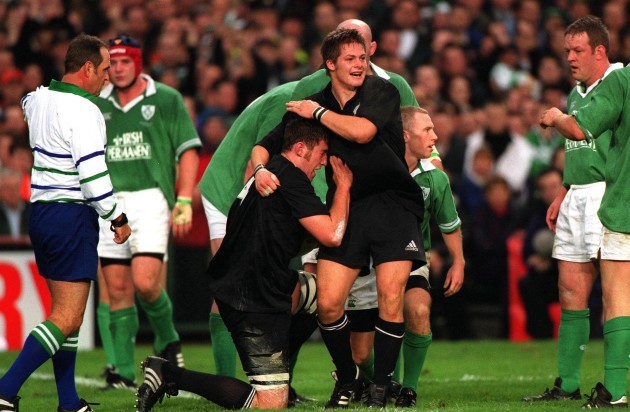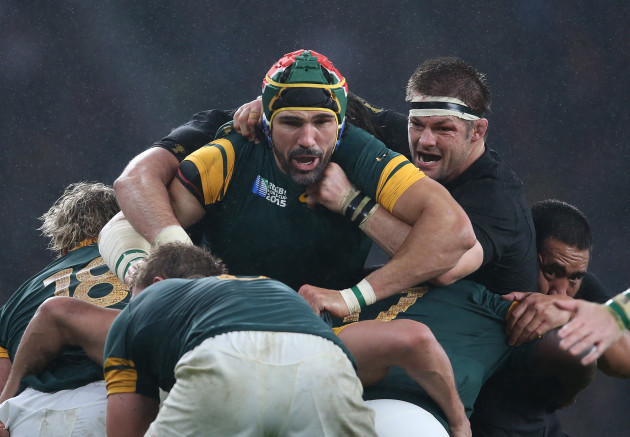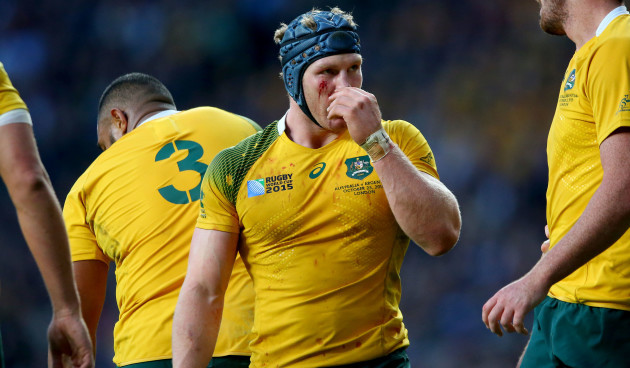I REMEMBER RICHIE McCaw’s debut for New Zealand well. I was at scrum-half for Ireland that day in 2001 at Lansdowne Road when the All Blacks beat us 40-29.
McCaw was only 20 but you knew the guy was incredibly special. He got a standing ovation at the dinner after the match when he picked up his first cap and the man of the match award. Not too many lads get that kind of reception after their debut.
We could all see that he was going to go on to phenomenal things. His breakdown ability is the key area, and always has been, but his work rate around the field has been frightening from that first day against us. He was everywhere.
Pick him out tomorrow and follow him for four or five phases, just note his work rate. He has an unbelievable energy at 34 years of age. Even when he starts on the far side of the ruck to where the ball goes he’ll often nearly be first there. You never see him walking.
In attack, you see him popping up in wider channels and being a really good ball player as well, it’s not just about hitting rucks. Take the Jerome Kaino try against South Africa, he draws and fixes a defender then puts Kaino away. He will run until he drops and that makes him the player he is.
McCaw gets opportunities at the breakdown that others don’t because they’re not in the right place at the right time. He reads the game so well, meaning he so often gets there a half second ahead of everyone else.
He might be in a good starting position and then when fellas try to clear him out, he’ll move his hips around to the side and try to get a trailing leg in even as he’s bring brought to ground. His nuisance factor, that fight to get at the ball, never ends.
Lots of what McCaw does is borderline illegal, but referees are under pressure from spectators and the powers-that-be to keep the game moving. McCaw probably understands that better than anyone – that he’s not going to be penalised every single time.
The way he lives on the edge makes him the great player he is and has been for so long. People get frustrated with it because he’s always there, always in there early. It’s only highlighted about McCaw because he reads the game so well and actually gets into those positions to start with.
McCaw puts his body in places that not too many others do, although David Pocock is one of them.
I wouldn’t be surprised if Pocock wins the World Player of the Year award he’s been nominated for. Think of the Australia number eight and you see him coming up from a breakdown after another turnover, his face all battered and bloodied.
His upper-body strength over the ball is just crazy. Once he gets onto the ball he borders on impossible to move. You see one, two, three guys come in to clear him away but they can’t budge him.
The knock-on effect Pocock’s breakdown effort has on the rest of the team – even when he’s eventually cleared and has to release the ball – is hard to underline enough.
Those two extra seconds completely change how you set your defensive line, the width you can get, when then enables you to come up aggressively off the line rather than with a drift defence. Pocock slowing the ball can have a huge effect on the gainline battle.
As a scrum-half it’s hell playing against someone like Pocock. Any time he’s near the ball it’s going to be scrappy, with hands on it, legs over it, even his head blocking you getting right at it.
His ability to slow ball is vital in tomorrow’s final but I think the All Blacks are in a strong position to fulfil their favouritism at Twickenham. The doubts in previous World Cups have been mental ones, but I think the Kiwis have moved beyond that.
Seeing how they have stepped their performance levels up for the knock-out stages has been one clear indicator. They also have the ability to change their game plant to suit the task at hand. We saw them rip France apart, but then come through a more physical, kicking-based game against South Africa.
They’ve got so many experienced guys about to bow out from international rugby and I think that mentally they are in a good place. I can’t see them throwing this opportunity away. No matter what kind of game we see tomorrow, the All Blacks have the skills to adapt to that.
Aaron Smith and Dan Carter are such a controlling set of halfbacks. If the game is slow, they kick as well as anyone in the world. If they can nullify Pocock and it’s quick ball, they have more ability than anyone to rip it up on front foot possession.
Either way, they’re in a great place to get the win tomorrow.
The Wallabies are in an interesting place as the underdogs for this final. With Michael Cheika driving them, they’ll have a quiet confidence about facing the All Blacks. He has done a phenomenal job in the last 12 months to turn things around.
Matt Giteau and Drew Mitchell coming back in was huge. They were missing something in midfield and Giteau has brought that for them, the consistency of his passing, running and kicking. Basic things, but he’s one of the best in the world because he does them well.
You can’t write them off and it wouldn’t be a major surprise to see them win. It’s going to be tight but I think New Zealand will be on the right side of it.



